Off the Job Assessment for Work Environment Cluster with CHC30113
VerifiedAdded on 2023/06/11
|8
|3063
|224
AI Summary
This off-the-job assessment is related to the Work Environment Cluster with CHC30113 for Early Childhood Education and Care. It includes ten short questions related to the Early Childhood Australia Code of Ethics, developing respectful relationships with families, legal and ethical problems, UN Convention on the Rights of the Child, Dignity of Risk, discrimination, and inappropriate discipline.
Contribute Materials
Your contribution can guide someone’s learning journey. Share your
documents today.
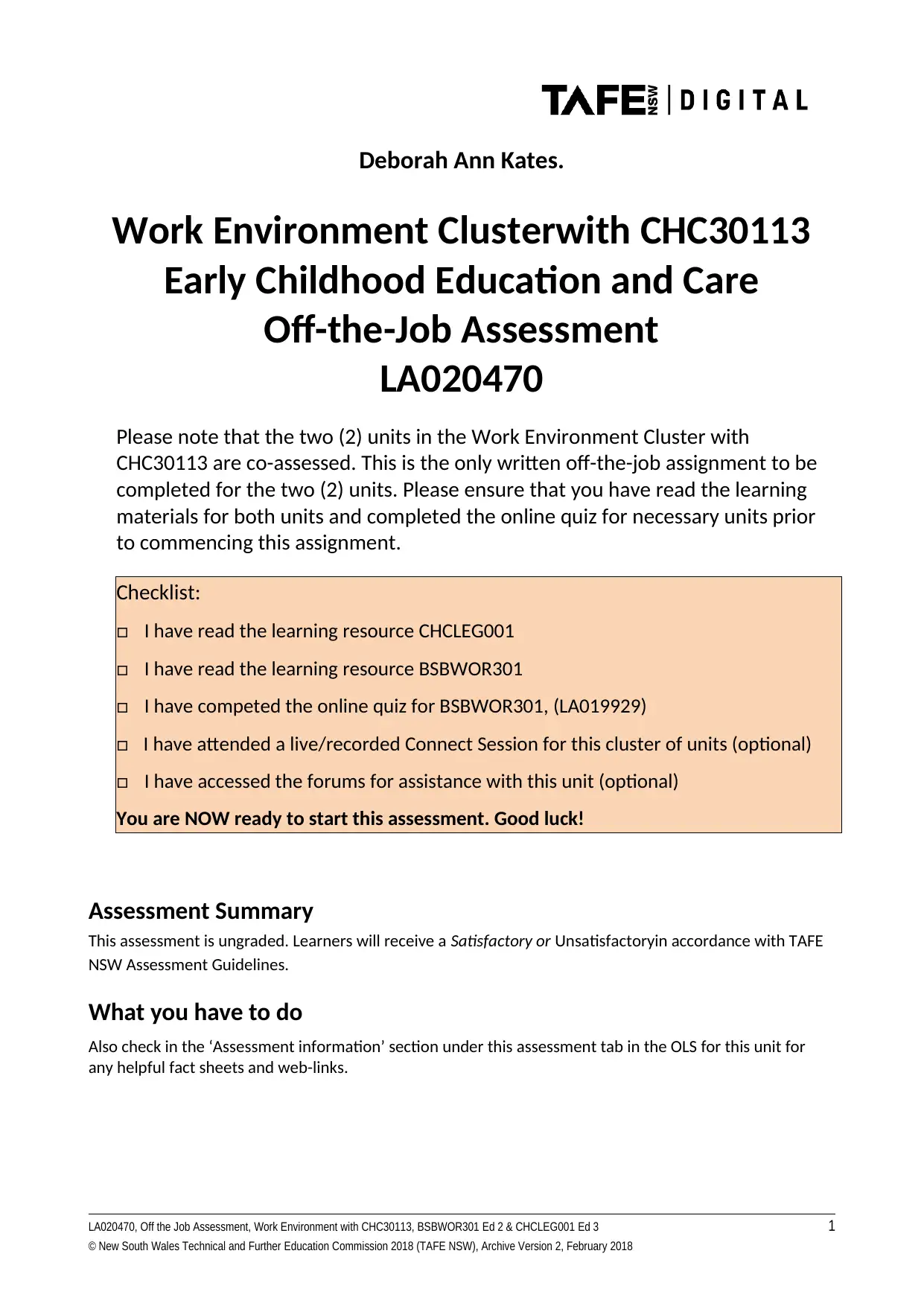
Deborah Ann Kates.
Work Environment Clusterwith CHC30113
Early Childhood Education and Care
Off-the-Job Assessment
LA020470
Please note that the two (2) units in the Work Environment Cluster with
CHC30113 are co-assessed. This is the only written off-the-job assignment to be
completed for the two (2) units. Please ensure that you have read the learning
materials for both units and completed the online quiz for necessary units prior
to commencing this assignment.
Checklist:
□ I have read the learning resource CHCLEG001
□ I have read the learning resource BSBWOR301
□ I have competed the online quiz for BSBWOR301, (LA019929)
□ I have attended a live/recorded Connect Session for this cluster of units (optional)
□ I have accessed the forums for assistance with this unit (optional)
You are NOW ready to start this assessment. Good luck!
Assessment Summary
This assessment is ungraded. Learners will receive a Satisfactory or Unsatisfactoryin accordance with TAFE
NSW Assessment Guidelines.
What you have to do
Also check in the ‘Assessment information’ section under this assessment tab in the OLS for this unit for
any helpful fact sheets and web-links.
LA020470, Off the Job Assessment, Work Environment with CHC30113, BSBWOR301 Ed 2 & CHCLEG001 Ed 3 1
© New South Wales Technical and Further Education Commission 2018 (TAFE NSW), Archive Version 2, February 2018
Work Environment Clusterwith CHC30113
Early Childhood Education and Care
Off-the-Job Assessment
LA020470
Please note that the two (2) units in the Work Environment Cluster with
CHC30113 are co-assessed. This is the only written off-the-job assignment to be
completed for the two (2) units. Please ensure that you have read the learning
materials for both units and completed the online quiz for necessary units prior
to commencing this assignment.
Checklist:
□ I have read the learning resource CHCLEG001
□ I have read the learning resource BSBWOR301
□ I have competed the online quiz for BSBWOR301, (LA019929)
□ I have attended a live/recorded Connect Session for this cluster of units (optional)
□ I have accessed the forums for assistance with this unit (optional)
You are NOW ready to start this assessment. Good luck!
Assessment Summary
This assessment is ungraded. Learners will receive a Satisfactory or Unsatisfactoryin accordance with TAFE
NSW Assessment Guidelines.
What you have to do
Also check in the ‘Assessment information’ section under this assessment tab in the OLS for this unit for
any helpful fact sheets and web-links.
LA020470, Off the Job Assessment, Work Environment with CHC30113, BSBWOR301 Ed 2 & CHCLEG001 Ed 3 1
© New South Wales Technical and Further Education Commission 2018 (TAFE NSW), Archive Version 2, February 2018
Secure Best Marks with AI Grader
Need help grading? Try our AI Grader for instant feedback on your assignments.
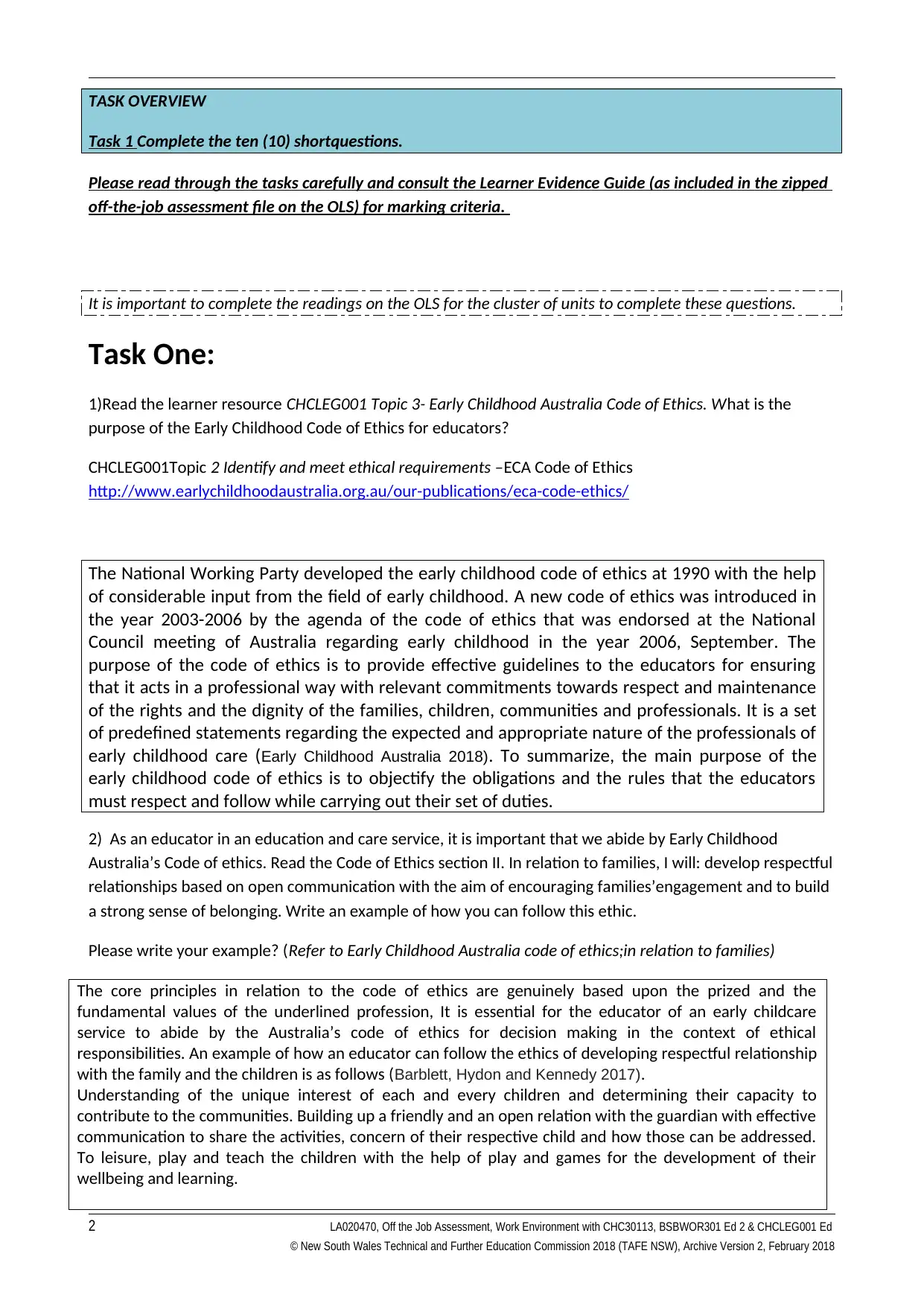
TASK OVERVIEW
Task 1 Complete the ten (10) shortquestions.
Please read through the tasks carefully and consult the Learner Evidence Guide (as included in the zipped
off-the-job assessment file on the OLS) for marking criteria.
It is important to complete the readings on the OLS for the cluster of units to complete these questions.
Task One:
1)Read the learner resource CHCLEG001 Topic 3- Early Childhood Australia Code of Ethics. What is the
purpose of the Early Childhood Code of Ethics for educators?
CHCLEG001Topic 2 Identify and meet ethical requirements –ECA Code of Ethics
http://www.earlychildhoodaustralia.org.au/our-publications/eca-code-ethics/
The National Working Party developed the early childhood code of ethics at 1990 with the help
of considerable input from the field of early childhood. A new code of ethics was introduced in
the year 2003-2006 by the agenda of the code of ethics that was endorsed at the National
Council meeting of Australia regarding early childhood in the year 2006, September. The
purpose of the code of ethics is to provide effective guidelines to the educators for ensuring
that it acts in a professional way with relevant commitments towards respect and maintenance
of the rights and the dignity of the families, children, communities and professionals. It is a set
of predefined statements regarding the expected and appropriate nature of the professionals of
early childhood care (Early Childhood Australia 2018). To summarize, the main purpose of the
early childhood code of ethics is to objectify the obligations and the rules that the educators
must respect and follow while carrying out their set of duties.
2) As an educator in an education and care service, it is important that we abide by Early Childhood
Australia’s Code of ethics. Read the Code of Ethics section II. In relation to families, I will: develop respectful
relationships based on open communication with the aim of encouraging families’engagement and to build
a strong sense of belonging. Write an example of how you can follow this ethic.
Please write your example? (Refer to Early Childhood Australia code of ethics;in relation to families)
The core principles in relation to the code of ethics are genuinely based upon the prized and the
fundamental values of the underlined profession, It is essential for the educator of an early childcare
service to abide by the Australia’s code of ethics for decision making in the context of ethical
responsibilities. An example of how an educator can follow the ethics of developing respectful relationship
with the family and the children is as follows (Barblett, Hydon and Kennedy 2017).
Understanding of the unique interest of each and every children and determining their capacity to
contribute to the communities. Building up a friendly and an open relation with the guardian with effective
communication to share the activities, concern of their respective child and how those can be addressed.
To leisure, play and teach the children with the help of play and games for the development of their
wellbeing and learning.
2 LA020470, Off the Job Assessment, Work Environment with CHC30113, BSBWOR301 Ed 2 & CHCLEG001 Ed
© New South Wales Technical and Further Education Commission 2018 (TAFE NSW), Archive Version 2, February 2018
Task 1 Complete the ten (10) shortquestions.
Please read through the tasks carefully and consult the Learner Evidence Guide (as included in the zipped
off-the-job assessment file on the OLS) for marking criteria.
It is important to complete the readings on the OLS for the cluster of units to complete these questions.
Task One:
1)Read the learner resource CHCLEG001 Topic 3- Early Childhood Australia Code of Ethics. What is the
purpose of the Early Childhood Code of Ethics for educators?
CHCLEG001Topic 2 Identify and meet ethical requirements –ECA Code of Ethics
http://www.earlychildhoodaustralia.org.au/our-publications/eca-code-ethics/
The National Working Party developed the early childhood code of ethics at 1990 with the help
of considerable input from the field of early childhood. A new code of ethics was introduced in
the year 2003-2006 by the agenda of the code of ethics that was endorsed at the National
Council meeting of Australia regarding early childhood in the year 2006, September. The
purpose of the code of ethics is to provide effective guidelines to the educators for ensuring
that it acts in a professional way with relevant commitments towards respect and maintenance
of the rights and the dignity of the families, children, communities and professionals. It is a set
of predefined statements regarding the expected and appropriate nature of the professionals of
early childhood care (Early Childhood Australia 2018). To summarize, the main purpose of the
early childhood code of ethics is to objectify the obligations and the rules that the educators
must respect and follow while carrying out their set of duties.
2) As an educator in an education and care service, it is important that we abide by Early Childhood
Australia’s Code of ethics. Read the Code of Ethics section II. In relation to families, I will: develop respectful
relationships based on open communication with the aim of encouraging families’engagement and to build
a strong sense of belonging. Write an example of how you can follow this ethic.
Please write your example? (Refer to Early Childhood Australia code of ethics;in relation to families)
The core principles in relation to the code of ethics are genuinely based upon the prized and the
fundamental values of the underlined profession, It is essential for the educator of an early childcare
service to abide by the Australia’s code of ethics for decision making in the context of ethical
responsibilities. An example of how an educator can follow the ethics of developing respectful relationship
with the family and the children is as follows (Barblett, Hydon and Kennedy 2017).
Understanding of the unique interest of each and every children and determining their capacity to
contribute to the communities. Building up a friendly and an open relation with the guardian with effective
communication to share the activities, concern of their respective child and how those can be addressed.
To leisure, play and teach the children with the help of play and games for the development of their
wellbeing and learning.
2 LA020470, Off the Job Assessment, Work Environment with CHC30113, BSBWOR301 Ed 2 & CHCLEG001 Ed
© New South Wales Technical and Further Education Commission 2018 (TAFE NSW), Archive Version 2, February 2018
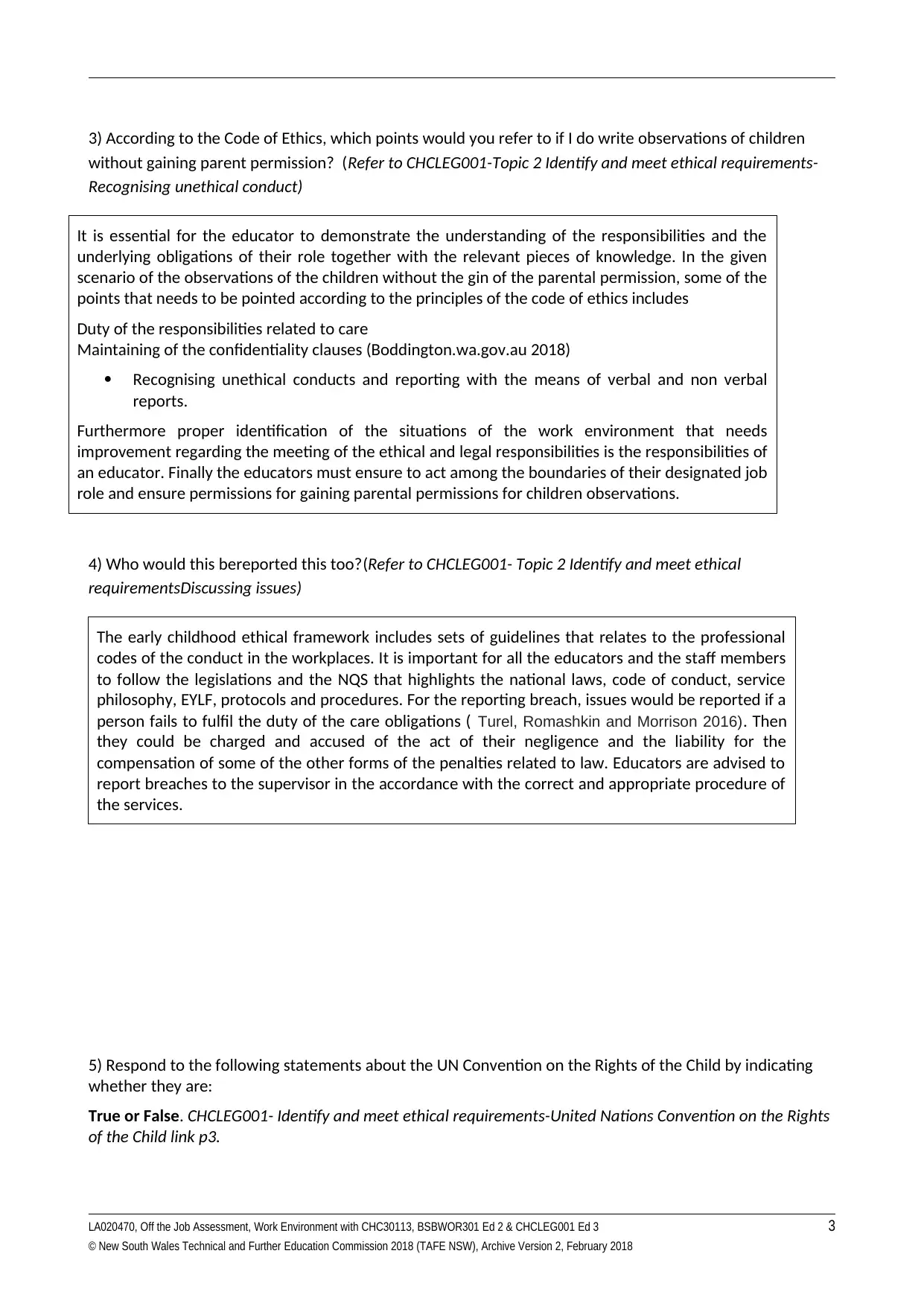
3) According to the Code of Ethics, which points would you refer to if I do write observations of children
without gaining parent permission? (Refer to CHCLEG001-Topic 2 Identify and meet ethical requirements-
Recognising unethical conduct)
It is essential for the educator to demonstrate the understanding of the responsibilities and the
underlying obligations of their role together with the relevant pieces of knowledge. In the given
scenario of the observations of the children without the gin of the parental permission, some of the
points that needs to be pointed according to the principles of the code of ethics includes
Duty of the responsibilities related to care
Maintaining of the confidentiality clauses (Boddington.wa.gov.au 2018)
Recognising unethical conducts and reporting with the means of verbal and non verbal
reports.
Furthermore proper identification of the situations of the work environment that needs
improvement regarding the meeting of the ethical and legal responsibilities is the responsibilities of
an educator. Finally the educators must ensure to act among the boundaries of their designated job
role and ensure permissions for gaining parental permissions for children observations.
4) Who would this bereported this too?(Refer to CHCLEG001- Topic 2 Identify and meet ethical
requirementsDiscussing issues)
The early childhood ethical framework includes sets of guidelines that relates to the professional
codes of the conduct in the workplaces. It is important for all the educators and the staff members
to follow the legislations and the NQS that highlights the national laws, code of conduct, service
philosophy, EYLF, protocols and procedures. For the reporting breach, issues would be reported if a
person fails to fulfil the duty of the care obligations ( Turel, Romashkin and Morrison 2016). Then
they could be charged and accused of the act of their negligence and the liability for the
compensation of some of the other forms of the penalties related to law. Educators are advised to
report breaches to the supervisor in the accordance with the correct and appropriate procedure of
the services.
5) Respond to the following statements about the UN Convention on the Rights of the Child by indicating
whether they are:
True or False. CHCLEG001- Identify and meet ethical requirements-United Nations Convention on the Rights
of the Child link p3.
LA020470, Off the Job Assessment, Work Environment with CHC30113, BSBWOR301 Ed 2 & CHCLEG001 Ed 3 3
© New South Wales Technical and Further Education Commission 2018 (TAFE NSW), Archive Version 2, February 2018
without gaining parent permission? (Refer to CHCLEG001-Topic 2 Identify and meet ethical requirements-
Recognising unethical conduct)
It is essential for the educator to demonstrate the understanding of the responsibilities and the
underlying obligations of their role together with the relevant pieces of knowledge. In the given
scenario of the observations of the children without the gin of the parental permission, some of the
points that needs to be pointed according to the principles of the code of ethics includes
Duty of the responsibilities related to care
Maintaining of the confidentiality clauses (Boddington.wa.gov.au 2018)
Recognising unethical conducts and reporting with the means of verbal and non verbal
reports.
Furthermore proper identification of the situations of the work environment that needs
improvement regarding the meeting of the ethical and legal responsibilities is the responsibilities of
an educator. Finally the educators must ensure to act among the boundaries of their designated job
role and ensure permissions for gaining parental permissions for children observations.
4) Who would this bereported this too?(Refer to CHCLEG001- Topic 2 Identify and meet ethical
requirementsDiscussing issues)
The early childhood ethical framework includes sets of guidelines that relates to the professional
codes of the conduct in the workplaces. It is important for all the educators and the staff members
to follow the legislations and the NQS that highlights the national laws, code of conduct, service
philosophy, EYLF, protocols and procedures. For the reporting breach, issues would be reported if a
person fails to fulfil the duty of the care obligations ( Turel, Romashkin and Morrison 2016). Then
they could be charged and accused of the act of their negligence and the liability for the
compensation of some of the other forms of the penalties related to law. Educators are advised to
report breaches to the supervisor in the accordance with the correct and appropriate procedure of
the services.
5) Respond to the following statements about the UN Convention on the Rights of the Child by indicating
whether they are:
True or False. CHCLEG001- Identify and meet ethical requirements-United Nations Convention on the Rights
of the Child link p3.
LA020470, Off the Job Assessment, Work Environment with CHC30113, BSBWOR301 Ed 2 & CHCLEG001 Ed 3 3
© New South Wales Technical and Further Education Commission 2018 (TAFE NSW), Archive Version 2, February 2018
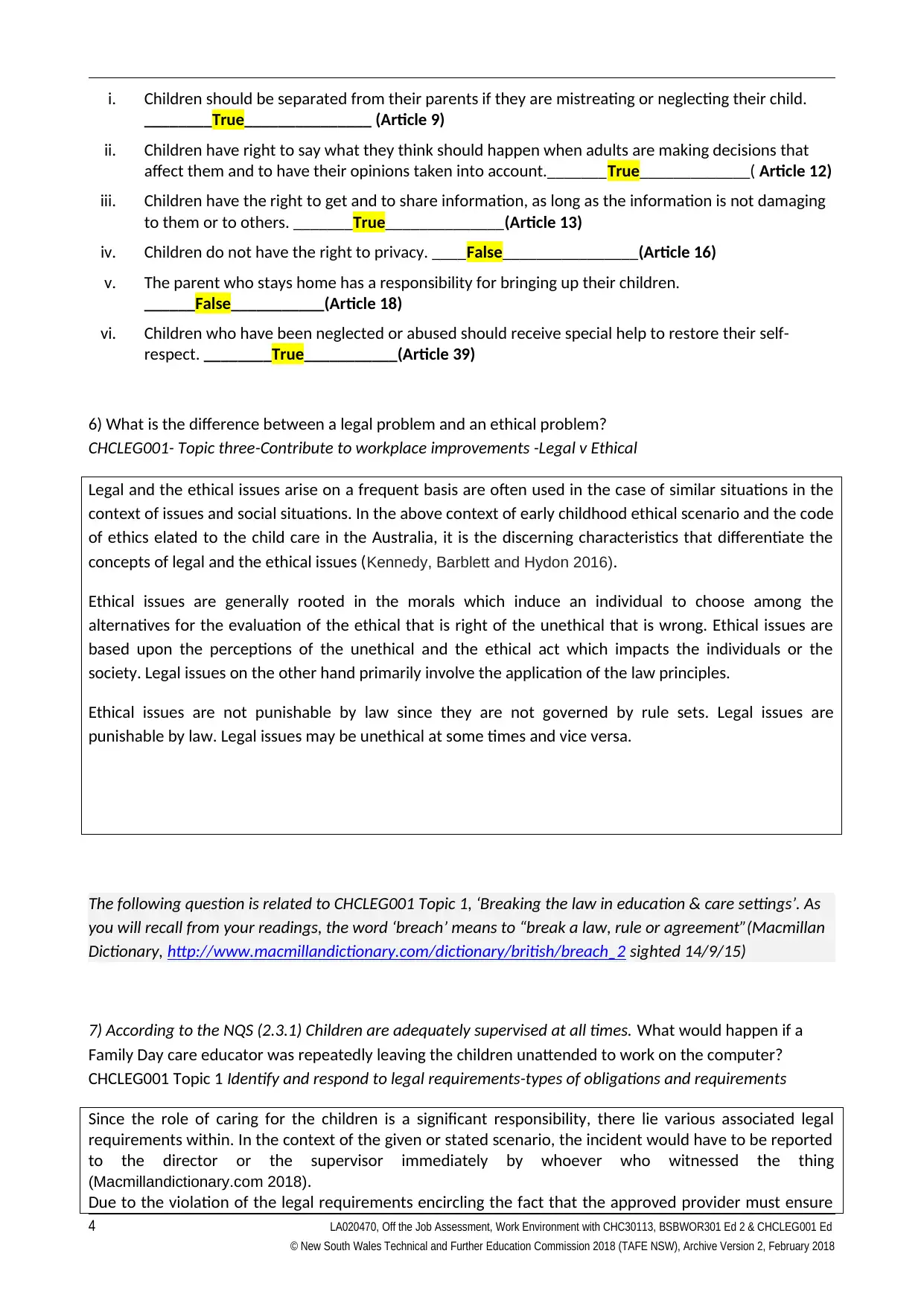
i. Children should be separated from their parents if they are mistreating or neglecting their child.
________True_______________ (Article 9)
ii. Children have right to say what they think should happen when adults are making decisions that
affect them and to have their opinions taken into account._______True_____________( Article 12)
iii. Children have the right to get and to share information, as long as the information is not damaging
to them or to others. _______True______________(Article 13)
iv. Children do not have the right to privacy. ____False________________(Article 16)
v. The parent who stays home has a responsibility for bringing up their children.
______False___________(Article 18)
vi. Children who have been neglected or abused should receive special help to restore their self-
respect. ________True___________(Article 39)
6) What is the difference between a legal problem and an ethical problem?
CHCLEG001- Topic three-Contribute to workplace improvements -Legal v Ethical
Legal and the ethical issues arise on a frequent basis are often used in the case of similar situations in the
context of issues and social situations. In the above context of early childhood ethical scenario and the code
of ethics elated to the child care in the Australia, it is the discerning characteristics that differentiate the
concepts of legal and the ethical issues (Kennedy, Barblett and Hydon 2016).
Ethical issues are generally rooted in the morals which induce an individual to choose among the
alternatives for the evaluation of the ethical that is right of the unethical that is wrong. Ethical issues are
based upon the perceptions of the unethical and the ethical act which impacts the individuals or the
society. Legal issues on the other hand primarily involve the application of the law principles.
Ethical issues are not punishable by law since they are not governed by rule sets. Legal issues are
punishable by law. Legal issues may be unethical at some times and vice versa.
The following question is related to CHCLEG001 Topic 1, ‘Breaking the law in education & care settings’. As
you will recall from your readings, the word ‘breach’ means to “break a law, rule or agreement”(Macmillan
Dictionary, http://www.macmillandictionary.com/dictionary/british/breach_2 sighted 14/9/15)
7) According to the NQS (2.3.1) Children are adequately supervised at all times. What would happen if a
Family Day care educator was repeatedly leaving the children unattended to work on the computer?
CHCLEG001 Topic 1 Identify and respond to legal requirements-types of obligations and requirements
Since the role of caring for the children is a significant responsibility, there lie various associated legal
requirements within. In the context of the given or stated scenario, the incident would have to be reported
to the director or the supervisor immediately by whoever who witnessed the thing
(Macmillandictionary.com 2018).
Due to the violation of the legal requirements encircling the fact that the approved provider must ensure
4 LA020470, Off the Job Assessment, Work Environment with CHC30113, BSBWOR301 Ed 2 & CHCLEG001 Ed
© New South Wales Technical and Further Education Commission 2018 (TAFE NSW), Archive Version 2, February 2018
________True_______________ (Article 9)
ii. Children have right to say what they think should happen when adults are making decisions that
affect them and to have their opinions taken into account._______True_____________( Article 12)
iii. Children have the right to get and to share information, as long as the information is not damaging
to them or to others. _______True______________(Article 13)
iv. Children do not have the right to privacy. ____False________________(Article 16)
v. The parent who stays home has a responsibility for bringing up their children.
______False___________(Article 18)
vi. Children who have been neglected or abused should receive special help to restore their self-
respect. ________True___________(Article 39)
6) What is the difference between a legal problem and an ethical problem?
CHCLEG001- Topic three-Contribute to workplace improvements -Legal v Ethical
Legal and the ethical issues arise on a frequent basis are often used in the case of similar situations in the
context of issues and social situations. In the above context of early childhood ethical scenario and the code
of ethics elated to the child care in the Australia, it is the discerning characteristics that differentiate the
concepts of legal and the ethical issues (Kennedy, Barblett and Hydon 2016).
Ethical issues are generally rooted in the morals which induce an individual to choose among the
alternatives for the evaluation of the ethical that is right of the unethical that is wrong. Ethical issues are
based upon the perceptions of the unethical and the ethical act which impacts the individuals or the
society. Legal issues on the other hand primarily involve the application of the law principles.
Ethical issues are not punishable by law since they are not governed by rule sets. Legal issues are
punishable by law. Legal issues may be unethical at some times and vice versa.
The following question is related to CHCLEG001 Topic 1, ‘Breaking the law in education & care settings’. As
you will recall from your readings, the word ‘breach’ means to “break a law, rule or agreement”(Macmillan
Dictionary, http://www.macmillandictionary.com/dictionary/british/breach_2 sighted 14/9/15)
7) According to the NQS (2.3.1) Children are adequately supervised at all times. What would happen if a
Family Day care educator was repeatedly leaving the children unattended to work on the computer?
CHCLEG001 Topic 1 Identify and respond to legal requirements-types of obligations and requirements
Since the role of caring for the children is a significant responsibility, there lie various associated legal
requirements within. In the context of the given or stated scenario, the incident would have to be reported
to the director or the supervisor immediately by whoever who witnessed the thing
(Macmillandictionary.com 2018).
Due to the violation of the legal requirements encircling the fact that the approved provider must ensure
4 LA020470, Off the Job Assessment, Work Environment with CHC30113, BSBWOR301 Ed 2 & CHCLEG001 Ed
© New South Wales Technical and Further Education Commission 2018 (TAFE NSW), Archive Version 2, February 2018
Secure Best Marks with AI Grader
Need help grading? Try our AI Grader for instant feedback on your assignments.
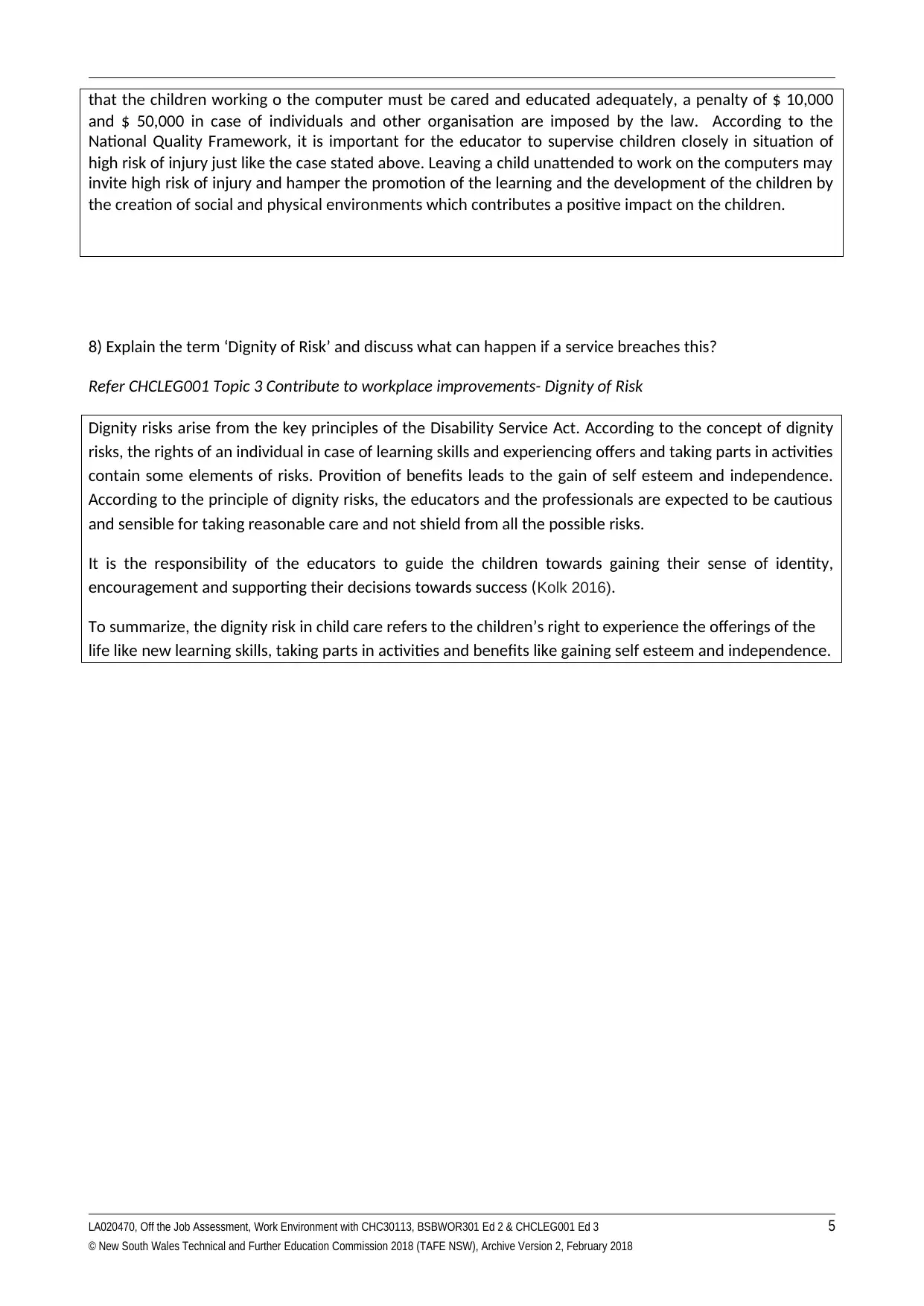
that the children working o the computer must be cared and educated adequately, a penalty of $ 10,000
and $ 50,000 in case of individuals and other organisation are imposed by the law. According to the
National Quality Framework, it is important for the educator to supervise children closely in situation of
high risk of injury just like the case stated above. Leaving a child unattended to work on the computers may
invite high risk of injury and hamper the promotion of the learning and the development of the children by
the creation of social and physical environments which contributes a positive impact on the children.
8) Explain the term ‘Dignity of Risk’ and discuss what can happen if a service breaches this?
Refer CHCLEG001 Topic 3 Contribute to workplace improvements- Dignity of Risk
Dignity risks arise from the key principles of the Disability Service Act. According to the concept of dignity
risks, the rights of an individual in case of learning skills and experiencing offers and taking parts in activities
contain some elements of risks. Provition of benefits leads to the gain of self esteem and independence.
According to the principle of dignity risks, the educators and the professionals are expected to be cautious
and sensible for taking reasonable care and not shield from all the possible risks.
It is the responsibility of the educators to guide the children towards gaining their sense of identity,
encouragement and supporting their decisions towards success (Kolk 2016).
To summarize, the dignity risk in child care refers to the children’s right to experience the offerings of the
life like new learning skills, taking parts in activities and benefits like gaining self esteem and independence.
LA020470, Off the Job Assessment, Work Environment with CHC30113, BSBWOR301 Ed 2 & CHCLEG001 Ed 3 5
© New South Wales Technical and Further Education Commission 2018 (TAFE NSW), Archive Version 2, February 2018
and $ 50,000 in case of individuals and other organisation are imposed by the law. According to the
National Quality Framework, it is important for the educator to supervise children closely in situation of
high risk of injury just like the case stated above. Leaving a child unattended to work on the computers may
invite high risk of injury and hamper the promotion of the learning and the development of the children by
the creation of social and physical environments which contributes a positive impact on the children.
8) Explain the term ‘Dignity of Risk’ and discuss what can happen if a service breaches this?
Refer CHCLEG001 Topic 3 Contribute to workplace improvements- Dignity of Risk
Dignity risks arise from the key principles of the Disability Service Act. According to the concept of dignity
risks, the rights of an individual in case of learning skills and experiencing offers and taking parts in activities
contain some elements of risks. Provition of benefits leads to the gain of self esteem and independence.
According to the principle of dignity risks, the educators and the professionals are expected to be cautious
and sensible for taking reasonable care and not shield from all the possible risks.
It is the responsibility of the educators to guide the children towards gaining their sense of identity,
encouragement and supporting their decisions towards success (Kolk 2016).
To summarize, the dignity risk in child care refers to the children’s right to experience the offerings of the
life like new learning skills, taking parts in activities and benefits like gaining self esteem and independence.
LA020470, Off the Job Assessment, Work Environment with CHC30113, BSBWOR301 Ed 2 & CHCLEG001 Ed 3 5
© New South Wales Technical and Further Education Commission 2018 (TAFE NSW), Archive Version 2, February 2018
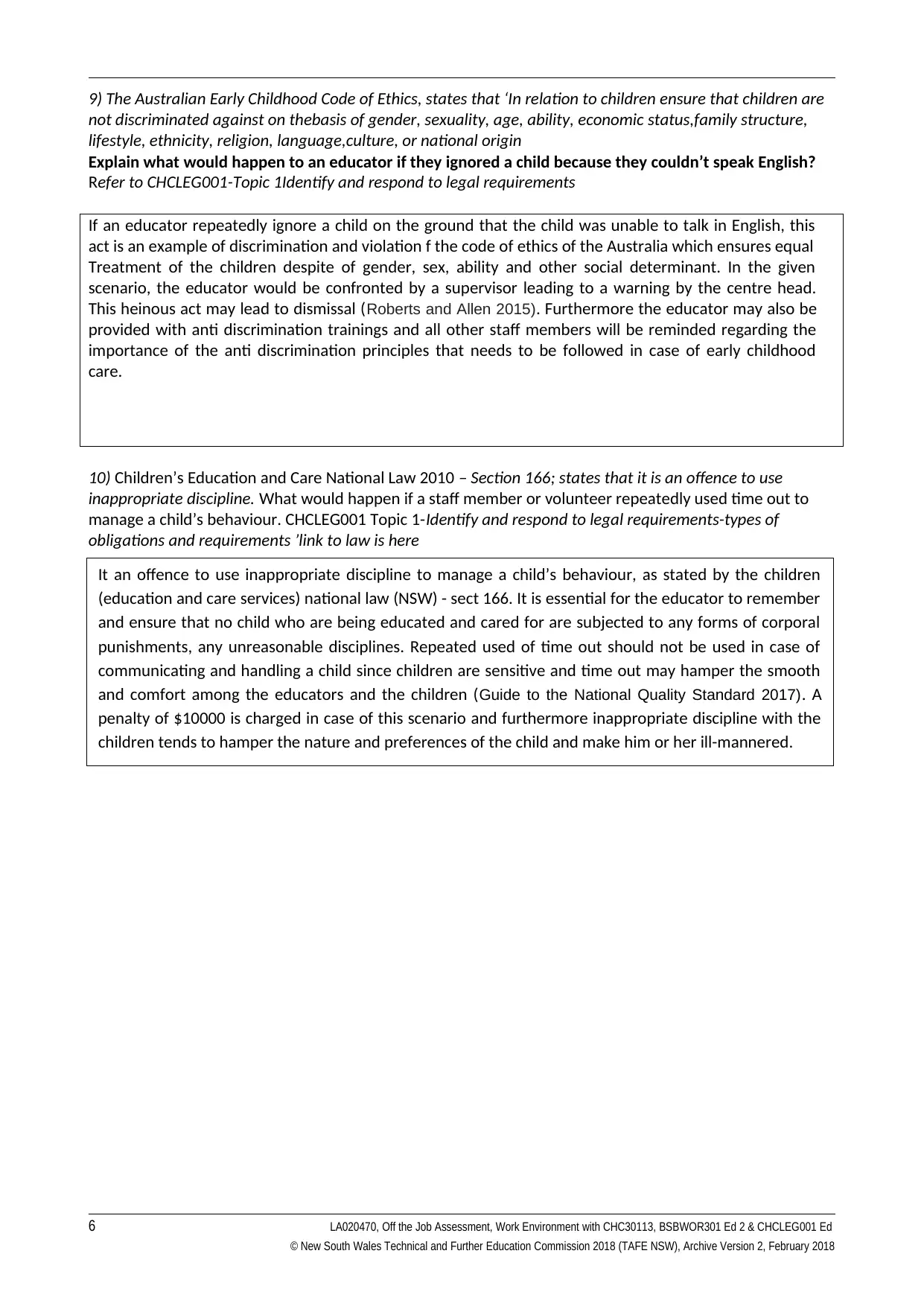
9) The Australian Early Childhood Code of Ethics, states that ‘In relation to children ensure that children are
not discriminated against on thebasis of gender, sexuality, age, ability, economic status,family structure,
lifestyle, ethnicity, religion, language,culture, or national origin
Explain what would happen to an educator if they ignored a child because they couldn’t speak English?
Refer to CHCLEG001-Topic 1Identify and respond to legal requirements
If an educator repeatedly ignore a child on the ground that the child was unable to talk in English, this
act is an example of discrimination and violation f the code of ethics of the Australia which ensures equal
Treatment of the children despite of gender, sex, ability and other social determinant. In the given
scenario, the educator would be confronted by a supervisor leading to a warning by the centre head.
This heinous act may lead to dismissal (Roberts and Allen 2015). Furthermore the educator may also be
provided with anti discrimination trainings and all other staff members will be reminded regarding the
importance of the anti discrimination principles that needs to be followed in case of early childhood
care.
10) Children’s Education and Care National Law 2010 – Section 166; states that it is an offence to use
inappropriate discipline. What would happen if a staff member or volunteer repeatedly used time out to
manage a child’s behaviour. CHCLEG001 Topic 1-Identify and respond to legal requirements-types of
obligations and requirements ’link to law is here
6 LA020470, Off the Job Assessment, Work Environment with CHC30113, BSBWOR301 Ed 2 & CHCLEG001 Ed
© New South Wales Technical and Further Education Commission 2018 (TAFE NSW), Archive Version 2, February 2018
It an offence to use inappropriate discipline to manage a child’s behaviour, as stated by the children
(education and care services) national law (NSW) - sect 166. It is essential for the educator to remember
and ensure that no child who are being educated and cared for are subjected to any forms of corporal
punishments, any unreasonable disciplines. Repeated used of time out should not be used in case of
communicating and handling a child since children are sensitive and time out may hamper the smooth
and comfort among the educators and the children (Guide to the National Quality Standard 2017). A
penalty of $10000 is charged in case of this scenario and furthermore inappropriate discipline with the
children tends to hamper the nature and preferences of the child and make him or her ill-mannered.
not discriminated against on thebasis of gender, sexuality, age, ability, economic status,family structure,
lifestyle, ethnicity, religion, language,culture, or national origin
Explain what would happen to an educator if they ignored a child because they couldn’t speak English?
Refer to CHCLEG001-Topic 1Identify and respond to legal requirements
If an educator repeatedly ignore a child on the ground that the child was unable to talk in English, this
act is an example of discrimination and violation f the code of ethics of the Australia which ensures equal
Treatment of the children despite of gender, sex, ability and other social determinant. In the given
scenario, the educator would be confronted by a supervisor leading to a warning by the centre head.
This heinous act may lead to dismissal (Roberts and Allen 2015). Furthermore the educator may also be
provided with anti discrimination trainings and all other staff members will be reminded regarding the
importance of the anti discrimination principles that needs to be followed in case of early childhood
care.
10) Children’s Education and Care National Law 2010 – Section 166; states that it is an offence to use
inappropriate discipline. What would happen if a staff member or volunteer repeatedly used time out to
manage a child’s behaviour. CHCLEG001 Topic 1-Identify and respond to legal requirements-types of
obligations and requirements ’link to law is here
6 LA020470, Off the Job Assessment, Work Environment with CHC30113, BSBWOR301 Ed 2 & CHCLEG001 Ed
© New South Wales Technical and Further Education Commission 2018 (TAFE NSW), Archive Version 2, February 2018
It an offence to use inappropriate discipline to manage a child’s behaviour, as stated by the children
(education and care services) national law (NSW) - sect 166. It is essential for the educator to remember
and ensure that no child who are being educated and cared for are subjected to any forms of corporal
punishments, any unreasonable disciplines. Repeated used of time out should not be used in case of
communicating and handling a child since children are sensitive and time out may hamper the smooth
and comfort among the educators and the children (Guide to the National Quality Standard 2017). A
penalty of $10000 is charged in case of this scenario and furthermore inappropriate discipline with the
children tends to hamper the nature and preferences of the child and make him or her ill-mannered.
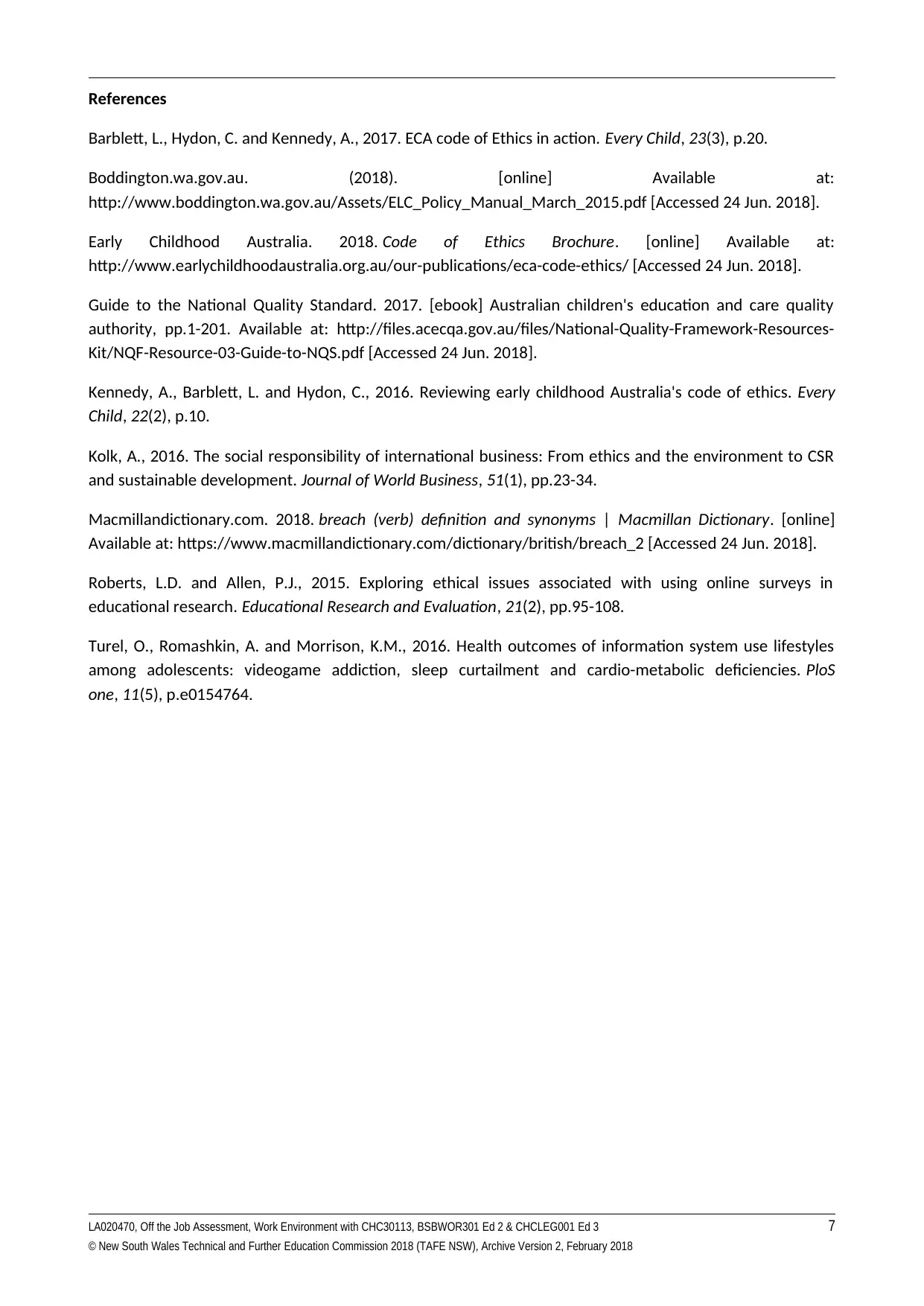
References
Barblett, L., Hydon, C. and Kennedy, A., 2017. ECA code of Ethics in action. Every Child, 23(3), p.20.
Boddington.wa.gov.au. (2018). [online] Available at:
http://www.boddington.wa.gov.au/Assets/ELC_Policy_Manual_March_2015.pdf [Accessed 24 Jun. 2018].
Early Childhood Australia. 2018. Code of Ethics Brochure. [online] Available at:
http://www.earlychildhoodaustralia.org.au/our-publications/eca-code-ethics/ [Accessed 24 Jun. 2018].
Guide to the National Quality Standard. 2017. [ebook] Australian children's education and care quality
authority, pp.1-201. Available at: http://files.acecqa.gov.au/files/National-Quality-Framework-Resources-
Kit/NQF-Resource-03-Guide-to-NQS.pdf [Accessed 24 Jun. 2018].
Kennedy, A., Barblett, L. and Hydon, C., 2016. Reviewing early childhood Australia's code of ethics. Every
Child, 22(2), p.10.
Kolk, A., 2016. The social responsibility of international business: From ethics and the environment to CSR
and sustainable development. Journal of World Business, 51(1), pp.23-34.
Macmillandictionary.com. 2018. breach (verb) definition and synonyms | Macmillan Dictionary. [online]
Available at: https://www.macmillandictionary.com/dictionary/british/breach_2 [Accessed 24 Jun. 2018].
Roberts, L.D. and Allen, P.J., 2015. Exploring ethical issues associated with using online surveys in
educational research. Educational Research and Evaluation, 21(2), pp.95-108.
Turel, O., Romashkin, A. and Morrison, K.M., 2016. Health outcomes of information system use lifestyles
among adolescents: videogame addiction, sleep curtailment and cardio-metabolic deficiencies. PloS
one, 11(5), p.e0154764.
LA020470, Off the Job Assessment, Work Environment with CHC30113, BSBWOR301 Ed 2 & CHCLEG001 Ed 3 7
© New South Wales Technical and Further Education Commission 2018 (TAFE NSW), Archive Version 2, February 2018
Barblett, L., Hydon, C. and Kennedy, A., 2017. ECA code of Ethics in action. Every Child, 23(3), p.20.
Boddington.wa.gov.au. (2018). [online] Available at:
http://www.boddington.wa.gov.au/Assets/ELC_Policy_Manual_March_2015.pdf [Accessed 24 Jun. 2018].
Early Childhood Australia. 2018. Code of Ethics Brochure. [online] Available at:
http://www.earlychildhoodaustralia.org.au/our-publications/eca-code-ethics/ [Accessed 24 Jun. 2018].
Guide to the National Quality Standard. 2017. [ebook] Australian children's education and care quality
authority, pp.1-201. Available at: http://files.acecqa.gov.au/files/National-Quality-Framework-Resources-
Kit/NQF-Resource-03-Guide-to-NQS.pdf [Accessed 24 Jun. 2018].
Kennedy, A., Barblett, L. and Hydon, C., 2016. Reviewing early childhood Australia's code of ethics. Every
Child, 22(2), p.10.
Kolk, A., 2016. The social responsibility of international business: From ethics and the environment to CSR
and sustainable development. Journal of World Business, 51(1), pp.23-34.
Macmillandictionary.com. 2018. breach (verb) definition and synonyms | Macmillan Dictionary. [online]
Available at: https://www.macmillandictionary.com/dictionary/british/breach_2 [Accessed 24 Jun. 2018].
Roberts, L.D. and Allen, P.J., 2015. Exploring ethical issues associated with using online surveys in
educational research. Educational Research and Evaluation, 21(2), pp.95-108.
Turel, O., Romashkin, A. and Morrison, K.M., 2016. Health outcomes of information system use lifestyles
among adolescents: videogame addiction, sleep curtailment and cardio-metabolic deficiencies. PloS
one, 11(5), p.e0154764.
LA020470, Off the Job Assessment, Work Environment with CHC30113, BSBWOR301 Ed 2 & CHCLEG001 Ed 3 7
© New South Wales Technical and Further Education Commission 2018 (TAFE NSW), Archive Version 2, February 2018
Paraphrase This Document
Need a fresh take? Get an instant paraphrase of this document with our AI Paraphraser
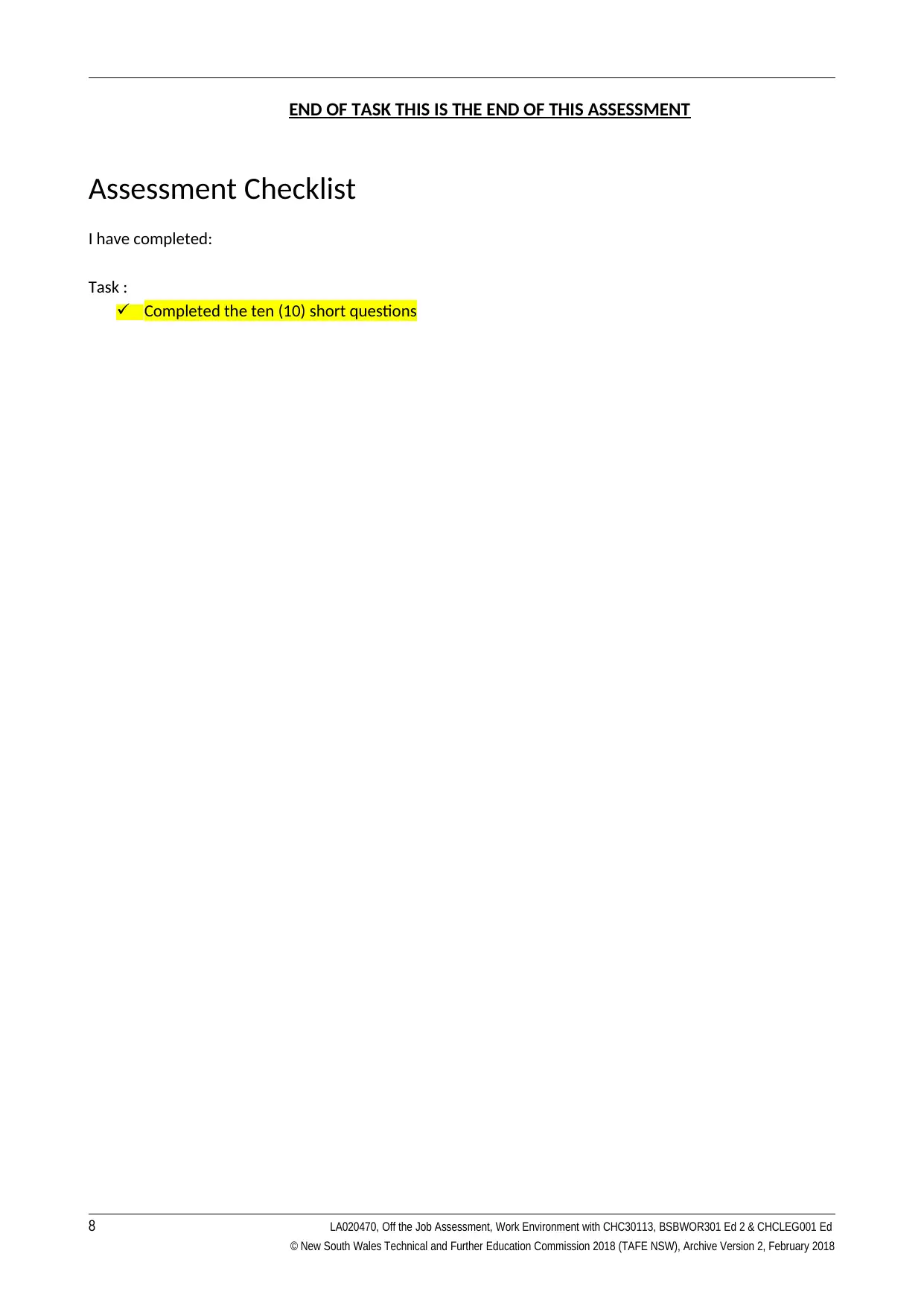
END OF TASK THIS IS THE END OF THIS ASSESSMENT
Assessment Checklist
I have completed:
Task :
Completed the ten (10) short questions
8 LA020470, Off the Job Assessment, Work Environment with CHC30113, BSBWOR301 Ed 2 & CHCLEG001 Ed
© New South Wales Technical and Further Education Commission 2018 (TAFE NSW), Archive Version 2, February 2018
Assessment Checklist
I have completed:
Task :
Completed the ten (10) short questions
8 LA020470, Off the Job Assessment, Work Environment with CHC30113, BSBWOR301 Ed 2 & CHCLEG001 Ed
© New South Wales Technical and Further Education Commission 2018 (TAFE NSW), Archive Version 2, February 2018
1 out of 8
Related Documents
Your All-in-One AI-Powered Toolkit for Academic Success.
+13062052269
info@desklib.com
Available 24*7 on WhatsApp / Email
![[object Object]](/_next/static/media/star-bottom.7253800d.svg)
Unlock your academic potential
© 2024 | Zucol Services PVT LTD | All rights reserved.




